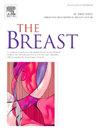新发转移性乳腺癌化疗系统治疗后的生物标志物改变
IF 5.7
2区 医学
Q1 OBSTETRICS & GYNECOLOGY
引用次数: 0
摘要
目前尚不清楚在新发转移性乳腺癌(dnMBC)患者接受化疗为基础的全身治疗(CST)后,雌激素受体(ER)、孕激素受体(PR)、人表皮生长因子受体-2(HER2)和Ki-67增殖指数等生物标志物的表达是否会发生变化。本研究旨在探讨CST前后生物标志物的表达及其对dnMBC患者预后的影响。方法采用基于医院的数据库,对2010年2月至2017年12月期间接受CST治疗的dnMBC患者进行回顾性队列研究。根据临床病理资料,检查CST后病理表现(ER、PR、HER-2、Ki-67)的变化。评估生物标志物转换对预后的影响。主要终点是总生存期(OS)。生存分析采用Kaplan-Meier法和log-rank检验。结果共纳入192例女性患者。术后ER、PR、HER-2和Ki-67的变化率分别为9.9%、17.2%、6.2%和25.5%。其中Ki-67从阴性到阳性表达的变化是观察到的最常见的不一致类型。四种生物标志物改变的患者与生物标志物未改变的患者的OS无统计学差异(p >;0.05)。有趣的是,ER和PR的阳性转化,以及HER2和Ki-67的持续阳性与不良预后显著相关(p <;0.001, p & lt;0.001;p = 0.029,p <;0.001)。家族史、初始转移部位和肿瘤分级是与生存相关的独立变量(p = 0.002,p <;0.001, p & lt;0.001)。结论CST后患者ER、PR、HER2、Ki-67水平均有变化。ER和PR转化阳性,HER2和Ki-67持续阳性表达可能提示预后不良。需要进一步的研究来确定是否需要在CST后进行生物标志物表达调查,以优化治疗方案并提高生存率。本文章由计算机程序翻译,如有差异,请以英文原文为准。
Biomarker alteration following chemotherapy-based systemic therapy in de novo metastatic breast cancer
Introduction
It is unclear whether the expression of biomarkers such as estrogen receptor (ER), progesterone receptor(PR), human epidermal growth factor receptor-2(HER2), and Ki-67 proliferation index changes following chemotherapy-based systemic therapy(CST) in patients with de novo metastatic breast cancer(dnMBC). The study aimed to investigate the expression of the biomarkers before and after CST and its impact on the prognosis of dnMBC patients.
Methods
Using hospital-based database, we conducted a retrospective cohort study on dnMBC patients who received CST between February 2010 and December 2017. Based on clinicopathological data, changes in pathological findings(ER,PR,HER-2,Ki-67) following CST were examined. The effect of biomarker conversion on prognosis was evaluated. The primary outcome was overall survival(OS). Kaplan-Meier method and log-rank test was used for survival analyses.
Results
The study included 192 female patients. The change rates of ER,PR,HER-2 and Ki-67 before and after CST were 9.9 %,17.2 %,6.2 % and 25.5 % respectively. Among them, the change in negative-to-positive expression of Ki-67 was the most common type of discordance observed. There was no statistical difference in OS between patients with changes in the four biomarkers and patients with no changes in the biomarkers(all p > 0.05). Interestingly, positive conversion of ER and PR, as well as persistent positive HER2 and Ki-67, were significantly associated with poor prognosis(p < 0.001,p < 0.001; p = 0.029,p < 0.001). Family history, initial metastatic site, and tumor grade were independent variables related to survival(p = 0.002,p < 0.001,p < 0.001).
Conclusions
Changes in ER, PR, HER2, and Ki-67 status were observed in patients following CST. Positive conversion of ER and PR, and persistent positive expression of HER2 and Ki-67 may indicate a poor prognosis. Further research is needed to determine whether biomarker expression investigations are needed following CST to optimize treatment options and improve survival.
求助全文
通过发布文献求助,成功后即可免费获取论文全文。
去求助
来源期刊

Breast
医学-妇产科学
CiteScore
8.70
自引率
2.60%
发文量
165
审稿时长
59 days
期刊介绍:
The Breast is an international, multidisciplinary journal for researchers and clinicians, which focuses on translational and clinical research for the advancement of breast cancer prevention, diagnosis and treatment of all stages.
 求助内容:
求助内容: 应助结果提醒方式:
应助结果提醒方式:


